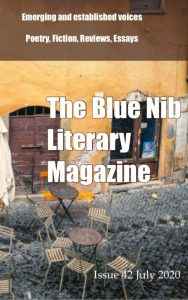Editorial for The Blue Nib, Issue 42.
Our reading habits, we are told, have substantially changed during the pandemic – and that includes poetry. We are reading more, and more online. And as people traditionally turn to poetry in times of crises, we may consider the surge in poetic activity as one of the better by-products of the pandemic.
The outpouring of lockdown-related lines during the past months was predictable, but the breadth and depth of subject matter both written and consumed was not. Months of semi-isolation have prompted many to question the value of our so-called ‘normal’ lives, and there has been a huge variety in the nature of poetry written and shared. As the work of the poets selected for this Issue reveals, poetry produced during the pandemic transcends its own situation and defies any attempt to sum it up in a simplistic way.
In their invitation to empathise, their keen observations, and their varying layers of humour, these poems ground us while also nourishing our spirits with their many interpretations of the shifting world in which we find ourselves.
Featured poet Angela Costi leads us into the world of ‘threaded memory, cobwebbed hope’ of her grandmother’s frailty through whom we learn to honour, rather than dismiss, the past. Respect is key; in marking the murder of an Irish woman walking home in Melbourne in 2012, the poet coaxes us to turn ‘our silent prayers into an anthem’ each time we too walk home.
The often veiled place of women in society is beautifully alluded in Anita Patel’s portrait of Elizabeth Jolley in the National Portrait Gallery, ‘just you, / Elizabeth, all your womanliness gathered stark and soft /… holding your secrets safe in a crumpled bag’ and in her reflections on Lakshmi, goddess of wealth, fortune and power, ‘and fickle as moonlight in a puddle’.
How we see things, and trickery of perception and representation, is the subject of Jennifer Compton’s elegant, spare homage to Australian photographer Olive Cotton, evidenced in her opening line ‘The moment of taking / is the moment she takes’ and such portrayals as ‘The triangles of her elbows / are little apertures’.
Penelope Layland’s ‘Naked on the street side’ also explores the awareness of self, in this case, a woman’s relief at walking freely ‘as one winged – feeling unclipped’ after being accustomed to being ‘steered … by her elbow’ by a partner which she comes to see as a ‘subtle / instrument of kind correction’.
We are beguiled in a very different way by the gritty lyricism of Justin Lowe’s ironic rendition of ‘the none-too-subtle / pound of flesh Jacobeans / the penny-dreadful of the belle epoque’, transporting us back through time to the ‘Zeppelin’s feline shadow’ and ‘knuckles of sulphurous fog’ of Woolwich Arsenal, 1915, site of huge-scale armaments manufacture.
Don’t be lulled, though, by the innocence of Anne Elvey’s title ‘Afternoon tea, Seaford Beach Café’ – the chiselled, precisely spaced lines that follow beckon to an alternative, almost Gothic, dimension to experience: ‘Her tongue / is a hallway runner. / Jaws open / to threadbare rain. / Against light / her gums are charcoal.’
Some titles herald more bluntly what is to follow, as in the case of Marion Pym Schaare’s ‘Gas for water’, which even in the jaggedness of its lines is a devastatingly poignant acknowledgment of her mother’s suffering in ‘Hitler’s own good country’ where she was haunted by such thoughts as ‘her eyelashes making contact with concrete floors / and hissing showers leaving black soot…’, and the poet is left, impossibly, ‘to remember to imagine her demons did not live in my dreams’.
The natural world remains a favourite subject and an endless source of inspiration – including wry analogies between animal life and that of humans. In his deft depiction of the behaviour of minors and magpies, Peter Mitchell reminds us that ‘Your life’s fretwork won’t collapse if you observe birds’ and urges us not to lose our sense of perspective lest we become like those academics who are ‘so busy self-referencing each other, / they don’t know they live in Birdland.’
Philip Radmall immerses us, magnificently, into our enduring fascination with bats and all they symbolise, with melodious lines such as, ‘slatted amongst the under-thatch and raftered eaves, / part of the high darknesses, caught alone in the thin / dagger of light that suddenly pressed into its wrap of leather.’
Consider, finally, Rachael Mead’s exquisite rendering of the natural world, ‘this cold winter shore / where the line slicing water from sky / is nothing but softness’ which prepares us for our awareness of, literally, our footprint, and how the crunch of our walking on sea-shells is nothing less than the ‘sound of the earth cracking’ beneath our weight.
To read good poetry is to make a journey; we emerge changed. Please enjoy the rich and varied journeys these wonderful poets are inviting you to make.

